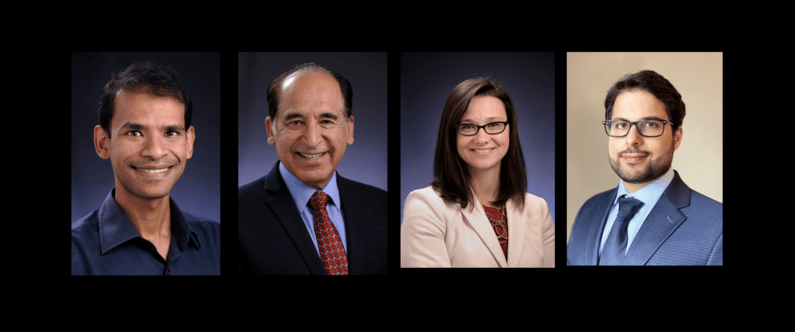WCM-Q experts discuss major health concerns at Health and YOU: Community Wellness Series webinars
 From left: Dr. Amit Abraham, Dr. Ravinder Mamtani, Jamie Gray, Dr. Tariq Chukir
From left: Dr. Amit Abraham, Dr. Ravinder Mamtani, Jamie Gray, Dr. Tariq Chukir
Three Weill Cornell Medicine-Qatar (WCM-Q) experts have addressed major health concerns facing communities around the world today in the latest instalments of the Health and YOU: Community Wellness Series.
In three separate webinars, the experts discussed the latest advances in diabetes prevention and management, plastics and human health, and finding quality health information online. The webinars were organized by the Institute for Population Health (IPH) at WCM-Q.
WCM-Q Assistant Professor of Medicine and Endocrinology Consultant at Qatar Metabolic Institute, Dr. Tariq Chukir, presented a webinar titled "Diabetes - Recent Advances in Prevention and Management." During the webinar, he urged people above the age of 45 or those with risk factors to get screened for diabetes. He stated that early detection and treatment can prevent serious complications, including cardiovascular diseases, kidney disease, diabetic retinopathy, and neuropathy. Dr. Chukir emphasized the importance of following a healthy lifestyle with a focus on weight management in the prevention and treatment of type 2 diabetes. He also clarified that there are several therapeutic options available, and the management should be individualized based on the patient's conditions and preferences.
In a separate webinar, WCM-Q alumnus Dr. Amit Abraham, now assistant professor of clinical population health sciences and population health research specialist at WCM-Q, spoke about the health impact of plastics on the community. He outlined the solutions that can be applied to reduce toxic exposure to plastic in day-to-day life. These include using food containers made of other materials like glass or stainless steel, and avoiding warming food in the microwave in plastic. He added that instead of using bottled water one can opt for tap water, carry a reusable water bottle and shopping bags, recycle when possible, and consider clothes made of natural fibres rather than the synthetic ones. Plastics are found in many everyday items, including polythene bags, toys, disposable cutlery, insulators, cigarette butts, shoes, clothes, and medical items. Preliminary research suggests that the chemical additives found in plastics could increase the risk of a range of diseases such as infertility, diabetes, heart diseases, cancer, and neurological anomalies, besides others.
In a webinar titled, ‘Sorting Fact from Fiction: Finding Quality Health Information Online’ Jamie Gray, director of the health sciences library at WCM-Q explored the health information ecosystem, how misinformation and disinformation spreads, and how to find and assess information on the web.
Gray noted that outdated or inaccurate health information could have serious impacts on wellbeing. For those who want to search online, starting at a site like MedlinePlus.gov is a good initial strategy. Another approach that can be used is to look for government, organizational or educational websites. She said libraries are also great places to reach out should you need help in finding reliable health information. However, Gray urged people to always discuss any information they find online with their healthcare provider.
Dr. Ravinder Mamtani, professor of population health sciences and vice dean for population health and lifestyle medicine at WCM-Q, and professor of medicine at the Center for Global Health, New York said: “The aim of the series is to create community awareness about health and disease to enhance self-care, reduce suffering, improve quality of life, and increase healthy longevity. We believe that the webinars have created a positive impact in the community because we bring experts to address health matters that are common worldwide.”